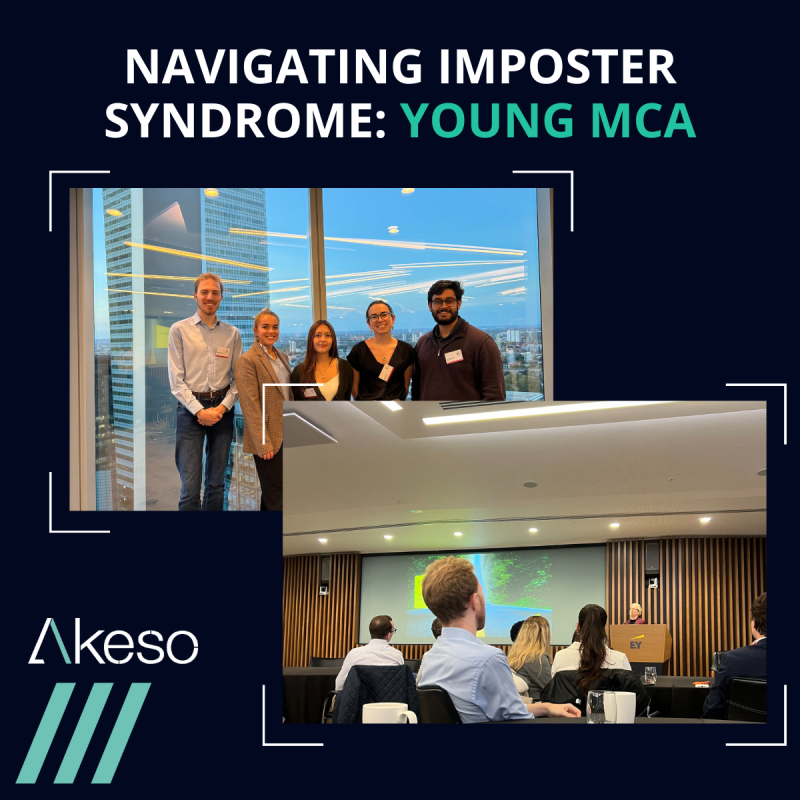Last night, Akeso’s Junior Consultants had the opportunity to attend the Young MCA event “Navigating Imposter Syndrome” hosted by EY and chaired by Josie Cluer. The evening provided both an insightful discussion on imposter syndrome and an excellent chance to network with like-minded young consultants from across the industry.
Understanding Imposter Syndrome
The session began by clarifying a critical point: imposter syndrome is not the same as experiencing healthy nerves or feeling stretched in a new role. Instead, it involves damaging thoughts and behaviours, where individuals internalise their achievements as luck or chance rather than recognising their hard-earned successes.
We then explored how imposter syndrome is more than just self-doubt – it can be a recurring pattern that undermines confidence and fosters a cycle of fear. This distinction is important for anyone looking to address it head-on.
Strategies for Overcoming Imposter Syndrome
Josie discussed practical ways to tackle imposter syndrome within the workplace:
- Normalise Self-Doubt: It is natural to feel some self-doubt when taking on new challenges. The key is recognising this as part of the growth process.
- Challenge Your Thoughts: When doubt creeps in, actively challenge your thoughts. Ask yourself if the fear of failure is based on facts or just negative assumptions.
- Open Conversations: Whether with a peer or manager, talking openly about your feelings can reduce the pressure. It often helps to realise that others, even senior professionals, have experienced similar challenges.
- Fail Out Loud: One of the most impactful pieces of advice Josie gave was to be brave and “fail out loud.” Making mistakes is part of learning, and being transparent about your failures can not only boost your own resilience but also inspire others around you.
The Outsider Effect – An Organisational Issue
The conversation didn’t stop at personal strategies; we also delved into the structural aspects of imposter syndrome. Certain groups, such as women and minorities, may be more prone to experiencing these feelings. A particularly engaging discussion revolved around the Harvard Business Review article, Stop Telling Women They Have Imposter Syndrome, which highlights that imposter syndrome is often exacerbated by environments that foster exclusion rather than inclusion.
This brings up a crucial point: it’s not always the individual who needs to change – organisations need to create environments where everyone can thrive.
Building a Sense of Belonging
A key takeaway from the event was the importance of building belonging in the workplace. This means considering different social dynamics, such as switching up traditional team drinks for a lunchtime walk with colleagues.
Furthermore, we need to be inclusive in our actions – acknowledging that some people are extroverts and others are introverts, often owing to different working styles.
To promote inclusivity within the hybrid working environment, discussions should be had and decisions made ‘in the room’. These should not be built upon and furthered without the whole team present, as it makes those working remotely feel excluded and unheard.
Lastly Josie urged us to share our courage and practice storytelling of lived experience within the workplace. She gave positive examples of successes leading to promotions or ways to work with certain managers to get the best out of a project alongside negative examples of sexism and microaggressions. Sharing stories whether they be positive or negative, can help everyone feel more included, heard and enable you to grow both personally and professionally.
Roundtable Discussions
The event featured engaging roundtable discussions where we broke into smaller groups to explore various aspects of imposter syndrome:
- Imposter Syndrome in Different Demographics: We focused on how gender, minority status, and high achievement levels contribute to imposter syndrome. A standout point was the experience of women feeling isolated in senior leadership teams, highlighting the importance of allies and mentors.
- Causes and Triggers of Imposter Syndrome: This discussion explored the personal, professional, and cultural factors that can trigger imposter syndrome. Comparison to others emerged as a common theme, and we emphasised the importance of challenging feedback and logging positive feedback to reinforce confidence.
- Coping Strategies: Sharing strategies to manage imposter syndrome was one of the most valuable aspects of the evening. Ideas included failing fast, getting feedback quickly, and remembering that nobody died when things go wrong!
- Impact on Mental Health: We explored the emotional toll that imposter syndrome can take, such as decision fatigue and the feeling of paralysis by analysis. Recognising our skills and asking for help when needed were suggested as key coping mechanisms.
What Can Organisations Do?
There was strong agreement that organisations play a critical role in supporting individuals with imposter syndrome. Practical actions include:
- Senior leadership setting an example by being open about their own challenges.
- Providing education within the workplace to normalise conversations about imposter syndrome.
- Introducing a buddy system to create a support network where employees can seek advice without feeling judged.
Overall, the event offered a wealth of insights, practical strategies, and inspiring discussions that will no doubt help many of us better navigate imposter syndrome in our careers. Special thanks to Young MCA and EY for facilitating such an enriching session.


